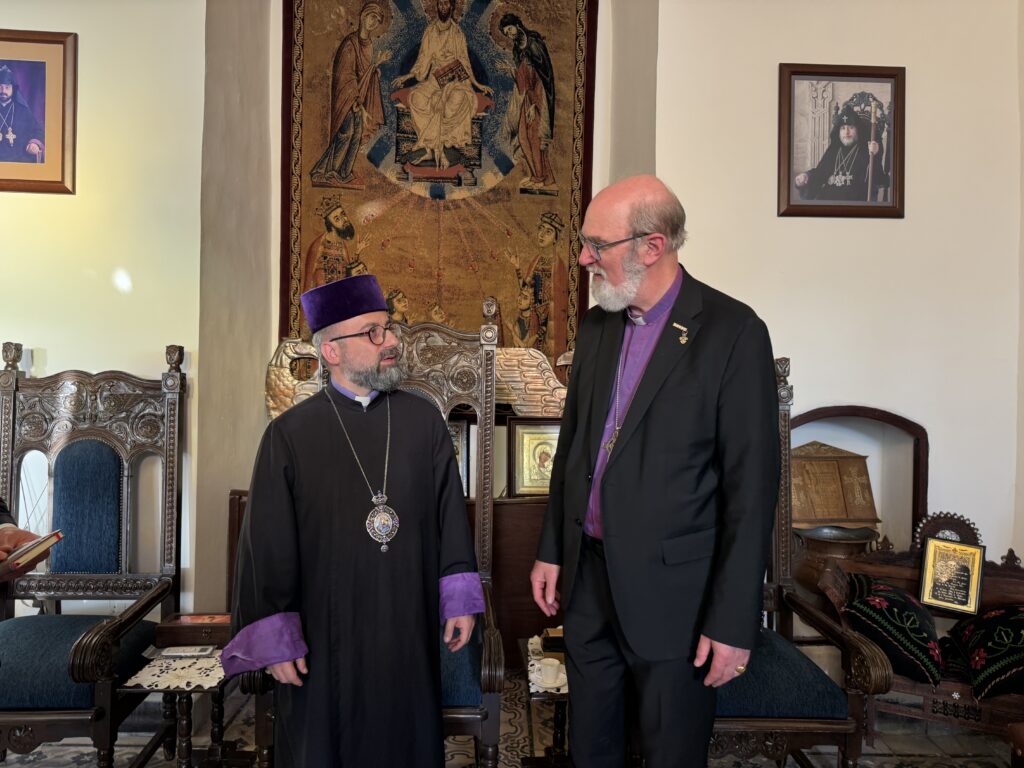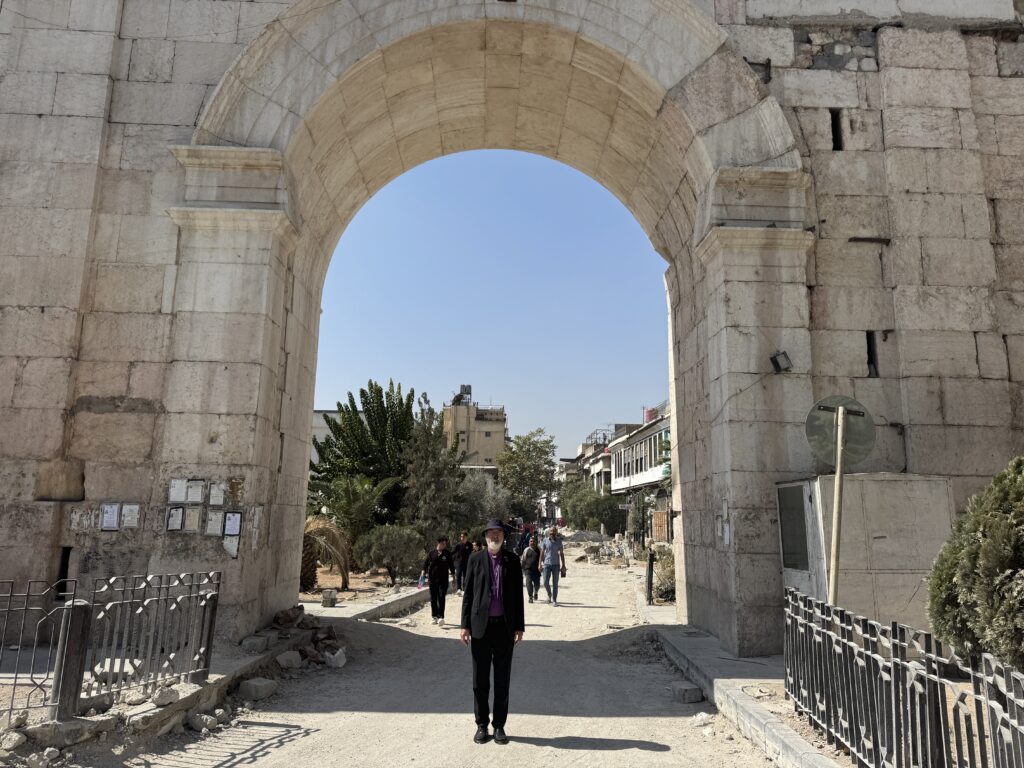(Bonn, 17.10.2025) In a timely show of international solidarity, Archbishop Prof. Thomas Schirrmacher, President of the International Society for Human Rights (ISHR), and Matthias Böhning, ISHR Secretary General, met with His Eminence Ignatius Aphrem II, Syriac-Orthodox Patriarch of Antioch and All the East, at the Patriarchate in Damascus. The ISHR President has met several times with the Patriarch since the latter’s inauguration in 2014. The visit, occurring just one day after Syria’s first parliamentary elections since the fall of the Assad regime in December 2024, focused on assessing the precarious situation facing the country’s Christian communities and exploring avenues for global support to foster pluralism and equal rights.
The meeting came at a pivotal juncture for Syria, following the rapid collapse of Bashar al-Assad’s 50-year Ba’athist rule. On December 8, 2024, a lightning offensive by opposition forces led by Hay’at Tahrir al-Sham (HTS) seized Damascus, forcing Assad to flee to Russia and marking the end of over a decade of civil war. Under interim President Ahmed al-Sharaa, a former HTS leader, the transitional government has prioritized nation-building, including yesterday’s indirect parliamentary elections. These polls, held on October 5, 2025, selected 140 of the 210 seats in the People’s Assembly through electoral subcommittees, with the remainder appointed by al-Sharaa. Notably, the process was not direct, excluded certain provinces like Raqqa and Hasakah due to security concerns, and resulted in an all-Sunni, all-male assembly, with no women elected—a stark reflection of the transitional challenges. While many Syrians, including Sunnis, express disappointment over the lack of broader representation, the elections signal a cautious step toward governance reform.

Syria’s Christian population, once comprising about 10 % of the nation’s pre-2011 total of roughly 22 million (around 1.5 million people), has dwindled dramatically to less than 2 %—estimated at 300,000 to 900,000 individuals—due to the civil war, economic collapse, and targeted persecution. Post-regime change, Christians have not faced direct targeting as a group, according to Patriarch Aphrem, though isolated losses occurred during attacks on coastal areas and Druze regions earlier in 2025. Incidents of sectarian violence, including a June church attack and July house burnings, have heightened fears, yet the new leadership has publicly pledged protections and property restorations. Salafist elements remain a tiny minority, but the overarching concern is the absence of pluralism: Christians seek equal citizenship in a civil state, akin to Turkey’s secular model, rather than religious governance.
During the discussions, Patriarch Aphrem emphasized the shock of the regime’s swift fall—achieved in just eight to nine days—and the unrealized expectations for inclusive change. He highlighted tensions between the Idlib-originated ruling faction (numbering 1,000-2,000 core members) and Syria’s Sunni business elite, who built major industries abroad, such as in Egypt’s textile sector. The Patriarch advocated for international observers to monitor commitments to an open society, including equal rights for women, faiths, and minorities—among them the unbelievably small number of only five or six Jews remaining in Damascus. He stressed that while the new president shows little interest in religious interference, true security lies in protecting all Syrians equally, not isolating Christians under international safeguards. Schools in Kurdish areas remain closed over curriculum disputes, underscoring risks of forceful resolutions that could displace more Christians.

Archbishop Schirrmacher, who is also president of the International Institute for Religious Freedom (IIRF) and a prominent global advocate for religious freedom, reaffirmed ISHR’s commitment to Syrian minorities. “The voices of Syria’s Christians must not be drowned out in this fragile transition; their call for a pluralistic society echoes the universal human right to equal citizenship,” said Schirrmacher. “We stand ready to bridge Europe and Damascus, urging policies that empower local protections over external interventions, ensuring that the promises of liberation translate into lived freedoms for all.”
ISHR Secretary General Böhning echoed the urgency for structured international action, drawing on the Patriarch’s insights into political capacity-building. “With no army left and governance offices still dysfunctional, Syria needs more than observation—it requires targeted support like training programs for Christian and moderate Muslim lay leaders in politics,” Böhning stated. “ISHR calls for the establishment of national platforms that foster dialogue, helping believers return and rebuild.”
The ISHR delegation’s visit underscores the organization’s ongoing mission to amplify marginalized voices amid geopolitical shifts. It forms part of a series of recent delegation trips to the region by the ISHR leadership and follows personal meetings in Lebanon (among others with Mor Ignatius Youssef III Younan, the Syriac-Catholic Patriarch) and Northern Iraq/Kurdistan. As Europe grapples with a coherent Syria policy the meeting highlights opportunities for civil society to drive inclusive reforms. During the meeting, Patriarch Aphrem was invited to participate in the upcoming Munich Security Conference in February 2026 by two further members of the ISHR delegation: Raid Gharib, a German-Syrian entrepreneur advocating for minority rights, and Dr. Philipp Hildmann, a Munich-based human rights scholar and ISHR advisor.
Downloads and Links
- Photo 1: The ISHR delegation at the Syrian Orthodox Patriarchate © IIRF/Dr. Esther Schirrmacher
- Photo 2: Archbishop Schirrmacher in conversation with the Armenian Archbishop of Damascus © IIRF/Dr. Esther Schirrmacher
- Photo 3: Archbishop Schirrmacher in conversation with the Syrian Orthodox Archbishop of Baghdad © IIRF/Dr. Esther Schirrmacher
- Photo 4: Thomas Schirrmacher on the “Straight Street” in Damascus mentioned in Acts 9:11, located in today’s Christian quarter, which is currently being repaved by the government © IIRF/Dr. Esther Schirrmacher


